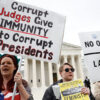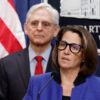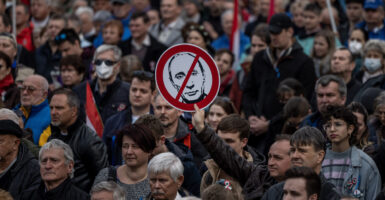Russia isn’t known for treating its own citizens humanely, especially opponents of Russian President Vladimir Putin. But Russia earned a reputation for treating its targets in Chechnya, Georgia, and Syria even more brutally. The people of Ukraine are the latest victims.
Russian forces have been shelling, bombing, and shooting targets across Ukraine since the invasion began Feb. 24. Under Putin, Russia has not taken proper account of human rights in its military operations. The nature and extent of the violations led President Joe Biden to declare Putin a war criminal.
In a written statement March 23, U.S. Secretary of State Antony Blinken detailed violent attacks by Russian forces on Ukrainian civilians, asserting that they also targeted hospitals, apartment buildings, schools, ambulances, and other non-military facilities.
Human Rights Watch reported Sunday that Russian forces had increased attacks on Ukrainian civilians, with the violence including rapes and executions.
Yet the Russian Federation still has a seat on the United Nations Human Rights Council, which is the U.N.’s preeminent international human rights body. The Human Rights Council is tasked with “promoting universal respect for the protection of all human rights and fundamental freedoms” and “address[ing] situations of violations of human rights, including gross and systematic violations.”
On March 28, the Senate Foreign Relations Committee sent a bipartisan, open letter to U.N. Ambassador Linda Thomas-Greenfield, praising the council’s March 4 decision to begin an investigation of human rights violations by Russia.
But the senators noted that Russia, through its actions in Ukraine, does not deserve to sit on the Human Rights Council. They urged the U.S. ambassador to the U.N. to “introduce a resolution to the U.N. General Assembly calling for the removal of the Russian Federation from the HRC immediately.”
Indeed, if the Human Right Council takes seriously its charge to identify violations and recommend necessary actions in response to gross and systemic human rights abuses, then Russia—which, as Ukrainian President Volodymyr Zelenskyy said, has “bathed the people of Ukraine in blood and tears”—doesn’t deserve its seat on the council.
Although originally reluctant, the Biden administration appears to have come around. On Monday, the U.S. announced that it will call on the General Assembly to remove Russia from the Human Rights Council.
Sadly, it appears that the U.S. will not have the support of U.N. Secretary-General Antonio Guterres in seeking to hold Russia to this small level of accountability. When asked about the prospect of suspending Russia, U.N. spokesperson Stephane Dujarric warned that “there’s a certain level of concern about the setting of a dangerous precedent.”
Will Russian atrocities in the Kyiv suburb of Bucha, widely reported over the weekend, raise enough concern to change Guterres’ mind? Hopefully so. If not, it reflects a terrible lack of moral clarity in Turtle Bay.
This week, the spotlight turns to the U.N. General Assembly, where a vote is set for Thursday. The U.N. was founded to maintain international peace and security and to promote respect for human rights. Every member state agreed to support the purposes and principles outlined in the U.N. Charter.
The General Assembly has the power to suspend a member state from the Human Rights Council “by a two-thirds majority of the members present and voting,” if that member “commits gross and systematic violations of human rights.”
The General Assembly is at a pivotal moment. If it fails to suspend Russia, it will make clear that it doesn’t take the council seriously nor value human rights enough to take even symbolic actions to affirm its commitment to human rights and the U.N. Charter.
The General Assembly must act. It is time to remove Russia from the Human Rights Council.
Have an opinion about this article? To sound off, please email letters@DailySignal.com and we’ll consider publishing your edited remarks in our regular “We Hear You” feature. Remember to include the url or headline of the article plus your name and town and/or state.






























